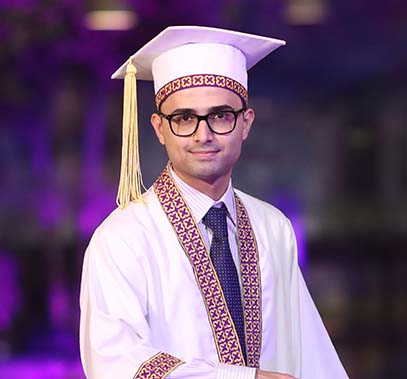
ARSALAN AHMED
Aspiration Statement
I wish to pursue a career in communication engineering. I have decided to pursue my graduate studies in this specialization. My long-term goal is to apply my knowledge for the advancement of communications technology leaving a positive footprint in society.
Core Skills
- C++
- Python
- SQL Coding
- Background in Wireless Communication
- Technical Research Writing
- Prototyping of Solutions
- MATLAB, Simulink, GNURadio etc.
Academic Awards / Achievements
- HU TOPS 100% Scholarship
- Dean's List Spring 2019
- Attended University of California, Berkeley in Summer 2019 as part of the HU Learn Abroad Program
Experience
Leadership / Meta-curricular
- University of Massachusetts, Boston, USA - Undergraduate Research Affiliate at the Ubiquitous Communications and Networking Lab (UCaN Lab)
- Habib University's Cricket Team - Captain since Fall 2019
Internship / Volunteer Work
- Student Researcher
Publications / Creative Projects
- Research paper on Machine Learning for Improved Resource Block Detection in 4G LTE Cognitive Radio Networks accepted at International Mobile, Intelligent, and Ubiquitous Computing Conference 2021. (Presented the paper in May 2021
Final Year Project
Project Title
Machine Learning for Improved Spectrum Sensing in 4G/5G Cognitive Radio Networks
Description
Our aim is to improve the performance of spectrum sensing for Cognitive Radio (CR) networks using effective Machine Learning (ML) algorithms so that spectrum holes in 4G/5G spectrum could be better identified and utilized for unlicensed communication. Increasing demand for wireless services have led to spectrum scarcity and inefficiency. As a solution, CRs are employed where spectrum sensing performance is adversely affected by varying conditions, posing a risk to licensed users. ML can be employed such that the CR network can constantly learn and improve from past experiences. Cognitive methods of dynamic spectrum access would allow seamless unlicensed communication without any interference to licensed users. We are proposing a novel spectrum sensing technique for CR over 4G/5G networks utilizing the strength of ML algorithms for the purpose of performance enhancement in terms of accurate detection of spectrum holes. The project can be extended by testing the proposed model on real-world signals through the use of Software Defined Radios (SDR).